Overseas Medical Qualifications Recognised in the UK: GMC Approval Guide

Table of Contents
Practising medicine in the United Kingdom is a prestigious and rewarding career path that attracts thousands of international medical graduates each year. However, one of the primary steps in becoming an international doctor in the UK involves having your overseas medical qualifications recognised by the General Medical Council (GMC).
This article will serve as your guide for understanding the criteria for acceptable overseas qualifications, the assessment process, and the implications for international graduates. By the end of this blog, you will be able to use this roadmap to ensure that your degree will be recognised in the UK by understanding the requirements to register with the GMC.
What is the GMC?
The GMC is the authoritative body responsible for maintaining the official register of medical practitioners within the UK. It is the GMC’s task to ensure that international medical graduates meet the high standards expected in the UK healthcare system.
In doing so, they make sure that every doctor is armed with the qualifications, theoretical knowledge, practical skills and experience to join the National Health Service (NHS) or get licensed to become an independent practitioner.
Understanding the Criteria for Overseas Medical Qualifications
Success in getting your overseas qualifications recognised depends on demonstrating that your medical education aligns with the high-quality, patient-centric care expected in the UK.
The GMC looks for certain essentials in a Primary Medical Qualification (PMQ):
What You’ve Studied
In order to be eligible for GMC approval, international medical graduates need to have studied allopathic medicine. Also called conventional or Western medicine, it is a branch of medical practice that uses pharmacologically active agents, physical intervention, radiation treatment, etc., to treat patients.
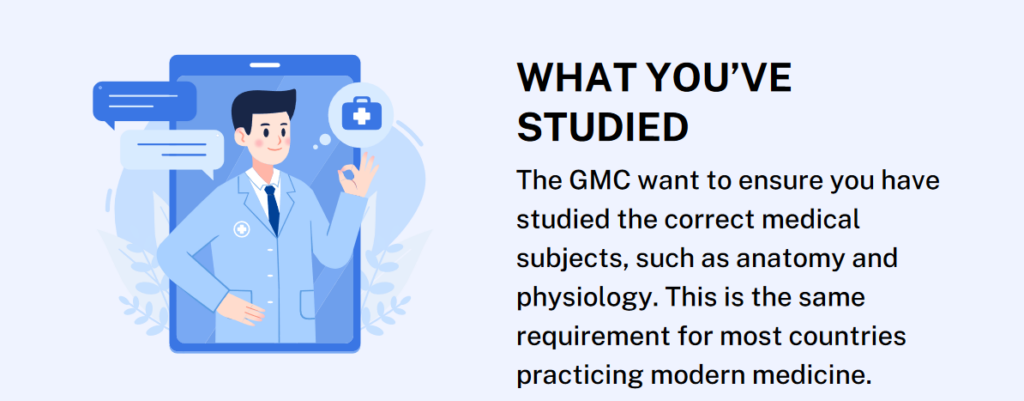

Where You’ve Studied
It's not just about studying medicine; it's where you study that also counts. You should either have a relevant European qualification (from one of 30 European countries), or your medical school must be featured in the World Directory of Medical Schools (WDOMS).
This directory is a list of accredited medical schools which provide comprehensive and high-quality education. It is meant to serve as a testament to a medical university’s global standing and assures the GMC that it adheres to international educational standards.
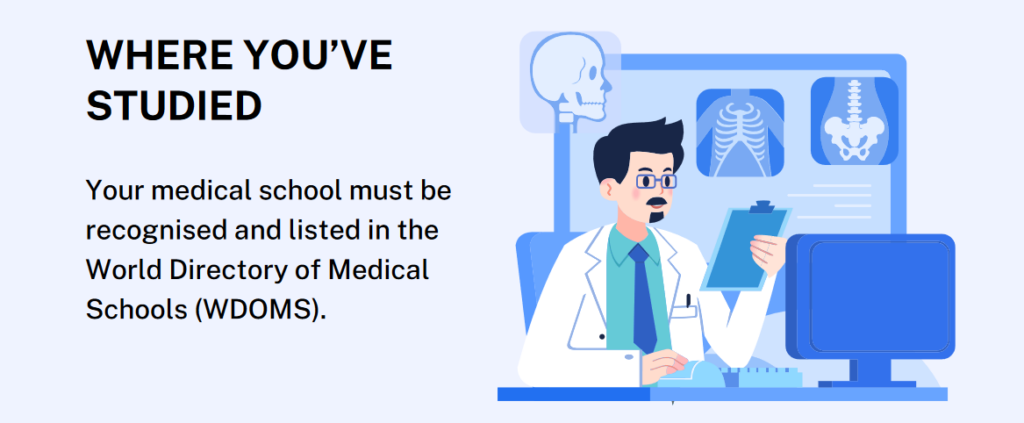

How You’ve Studied
First of all, your medical programme needs to include a minimum of 5,500 hours over a period of 3+ years for your qualification to be eligible.
Secondly, your qualification cannot be completed entirely online; it has to include in-person components.
Lastly, your medicine course needs to have a significant amount of clinical training with clinical in-person experience. Your practical training has to include exposure to medicine and surgery under the supervision and approval of your medical school.
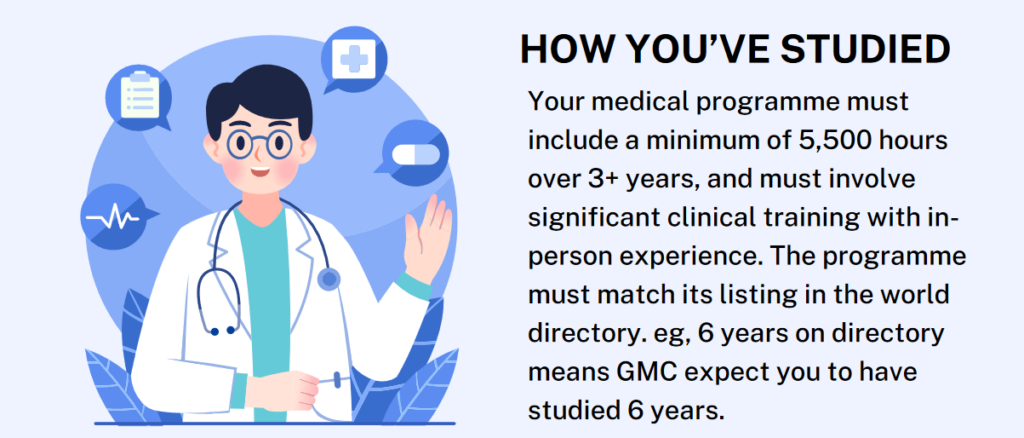

ECFMG-Verified Programme
Your medical qualification needs to be accepted and independently verified by the Educational Commission for Foreign Medical Graduates (ECFMG). This can be done through their online portal called the Electronic Portfolio of International Credentials (EPIC) service.
It is important to note that you don’t need to be ECFMG-certified personally, but rather your degree needs to be verified as authentic and following international standards.
For more information on the topic, you can read our informative blog on What you must know about the GMC, WFME and ECFMG.
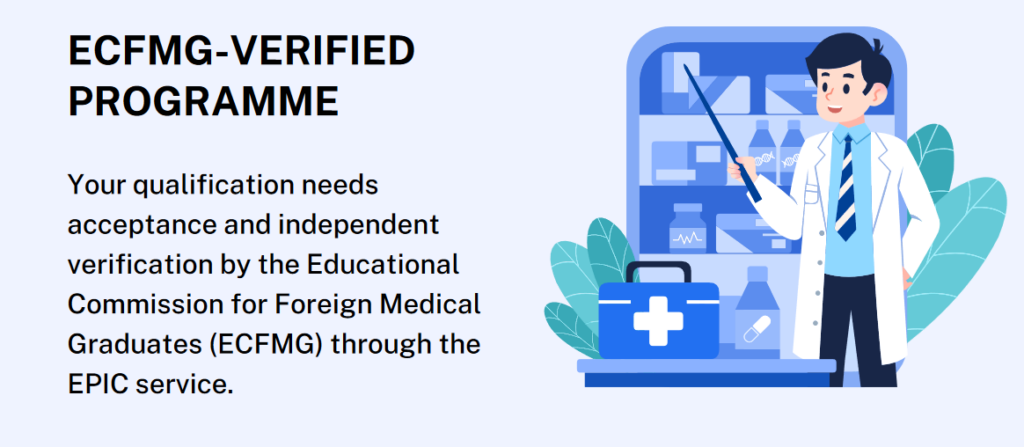

If You’ve Transferred
If you’re planning on switching universities or if you've already transferred, there are several cases in which your qualification will be accepted in the UK:
- The medical school you’ve transferred to is part of a twin/dual-degree programme or is a branch of the university you’re studying in.
- You had legitimate reasons for being unable to complete your degree at your original medical school.
- The credits that went toward the completion of your degree should not include any that were transferred from a university that is deemed unacceptable by GMC standards.
- Your credits cannot be transferred from a med school due to failure or dismissal.
- Your credits cannot have been transferred from a non-MBBS, MD or equivalent programme (e.g. nursing, biomedicine). This means that in order to be eligible, you will need to go through a full medicine course rather than transferring to one.
If your qualification includes or is comprised of credits transferred from a university on the GMC’s approved list, they will conduct an assessment to ascertain if your qualification meets their criteria.
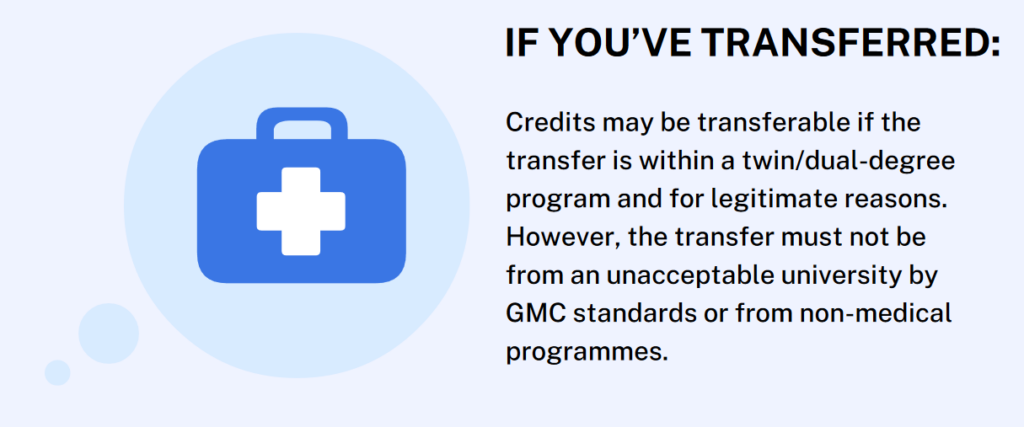

English Language Proficiency
Communicating effectively is non-negotiable. The GMC requires proof of English proficiency, often through tests like the IELTS or OET. This is meant to ensure that every doctor can interact freely with patients and colleagues.
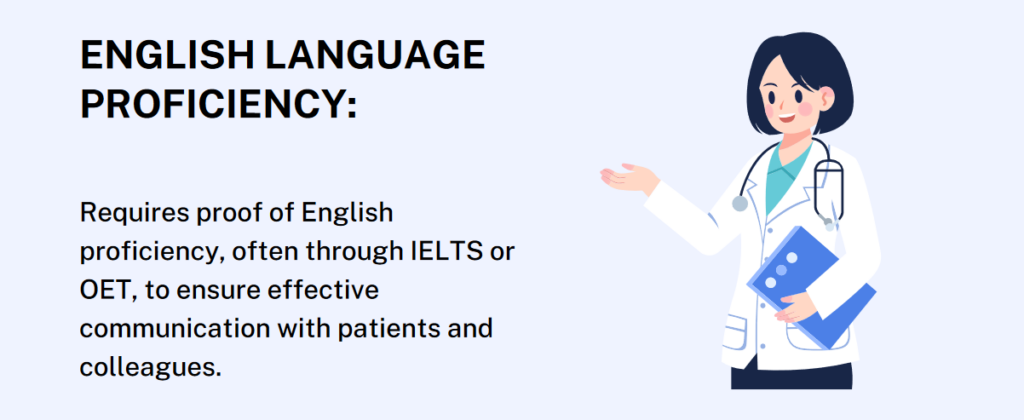

Taking the PLAB Test
If your PMQ is assessed to meet the GMC’s standards, then you will be given the green light to take the Professional and Linguistic Assessments Board (PLAB) test. The exam is designed to ascertain an international student's theoretical knowledge and practical skills to see if they’re qualified to join the UK’s workforce.
You can read more about the test here: What is the Plab Test?
It’s important to note that if you’re holding a GMC-recognised qualification, then you might not even need to sit the PLAB test.
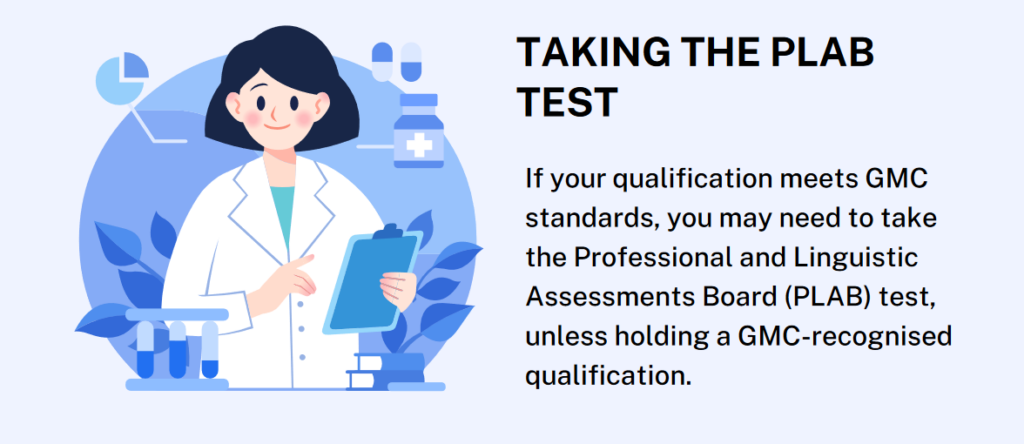

How to Make Sure that Your International Qualification Meets GMC Standards
No matter if you’re just about to start studying medicine or if you’re currently a medical student, there’s an easy way to verify if your degree will be accepted in the UK.
Medlink Students offers free consultations for students who want to study medicine abroad, and we can provide you with the guidance needed to ensure that your medical qualification will be accepted in the UK.
We’re a team of accomplished international doctors, admission experts, and academic advisors with over a decade of experience. We have a comprehensive understanding of the requirements of the GMC, and we can guide you through the process of ensuring that your medical qualification is fully recognised.
Unsure which university is GMC compliant? Get a free consultation from our academic advisors:
Check your email to Book a FREE call
with an expert advisor
Look at your promotions/spam folders, just in case.
The Path to Recognition
The journey begins with applying for registration with the GMC, which will verify if your PMQ ticks all the right boxes through an initial check.
The GMC then takes a closer look at your PMQ, comparing it with the UK's rigorous medical degrees. This ensures that your education and training are up to par and that you’ve got both the theoretical knowledge and practical skills needed to become a successful doctor in the United Kingdom.
Additionally, the GMC also considers postgraduate qualifications, acknowledging your continued pursuit of medical excellence.
Once your degree is deemed to be up to the GMC’s standards, you will be able to take the PLAB test and become eligible for residency training in the UK.
If you’re an EU graduate and want a detailed overview of how to register with the GMC, you can check out our blog: How to Become a Doctor in the UK: GMC Registration for EU Medical Graduates
GMC-Approved Courses
The European medical programmes in the 30 countries on the GMC’s approval list are recognised for their high-quality education standard. These programmes are designed to equip students with a comprehensive understanding of medical practices, aligning well with the GMC’s standards.
Alternatively, in the Caribbean, both the 4-year graduate entry courses and complete programmes are recognised for their intensive, hands-on approach to medical education. Graduates from these programmes are well-prepared for the challenges of a medical career, often bringing diverse and rich experiences to the UK’s medical landscape.
However, it’s essential that you’ve graduated from a reputable Caribbean medical school that is accredited and listed on the World Directory of Medical Schools. A perfect example of such a university is the University of Health Sciences Antigua, which has many graduates with successful careers in the UK, thanks to its comprehensive curriculum that aligns with all GMC criteria.
Reserve Your Spot for Our Webinar
Ensure Your Medical Degree is Recognised in the UK
In Summary
The process of having your overseas medical qualification accepted in the UK is detailed but far from impossible. It’s all about showcasing your qualifications, experience, and readiness to join the UK’s medical professionals.
The United Kingdom and the NHS are always in need of qualified healthcare professionals and openly welcome international medical graduates, valuing the diverse skills and perspectives they bring.
Hopefully, with the help of this blog, you are now armed with the guidance and understanding needed to start your successful journey toward becoming a successful doctor in the UK.
FAQs
What makes an overseas qualification acceptable in the UK?
The essential criteria are:
- The university’s programme has to be in allopathic medicine.
- The course should provide high-quality education comparable to the UK. This includes studying at least 5,500 hours for 3+ years, sufficient clinical experience, and in-person education.
- The medical school should be listed in the World Directory of Medical Schools, and the degree should be ECFMG-verified.
- English language proficiency
How are these qualifications assessed?
Through a thorough review process that includes initial screening and detailed examination of the PMQs' comparability to UK standards.
Do European and Caribbean qualifications have a smooth path to GMC registration?
Yes, provided they meet the GMC’s rigorous criteria, highlighting the global recognition of these programmes.
What if my qualification doesn't automatically meet GMC criteria?
Additional evidence of training before taking the PLAB test might be necessary.
What's the role of the PLAB test?
It assesses your capability to work at the level of a UK doctor starting their second year of the Foundation Programme.
How has Brexit affected overseas qualifications?
Brexit has led to changes in how EU qualifications are recognised, requiring some EU-qualified doctors to provide additional evidence of their training before passing the PLAB test.
Where can I find support?
Medlink Students can answer any questions you may have and provide guidance on your path to becoming a doctor in the UK.
One comment on “Overseas Medical Qualifications Recognised in the UK: GMC Approval Guide”
Leave a Reply

About Medlink Students
Leading international recruitment company for medical students in Europe. British Council Certified Agents. 10+ years of experience and more than 10,000 students advised.






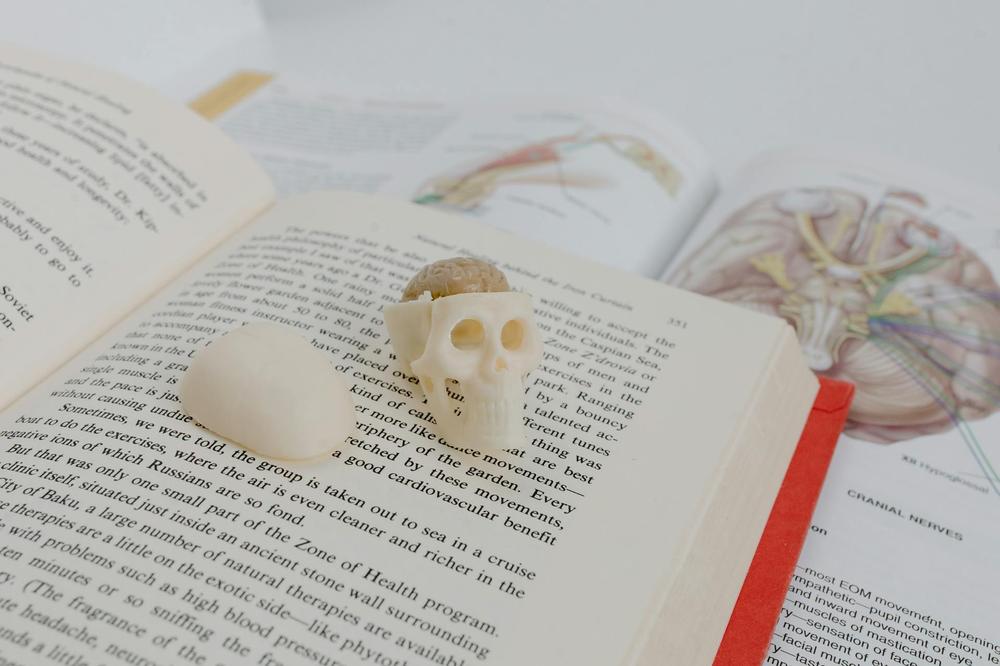
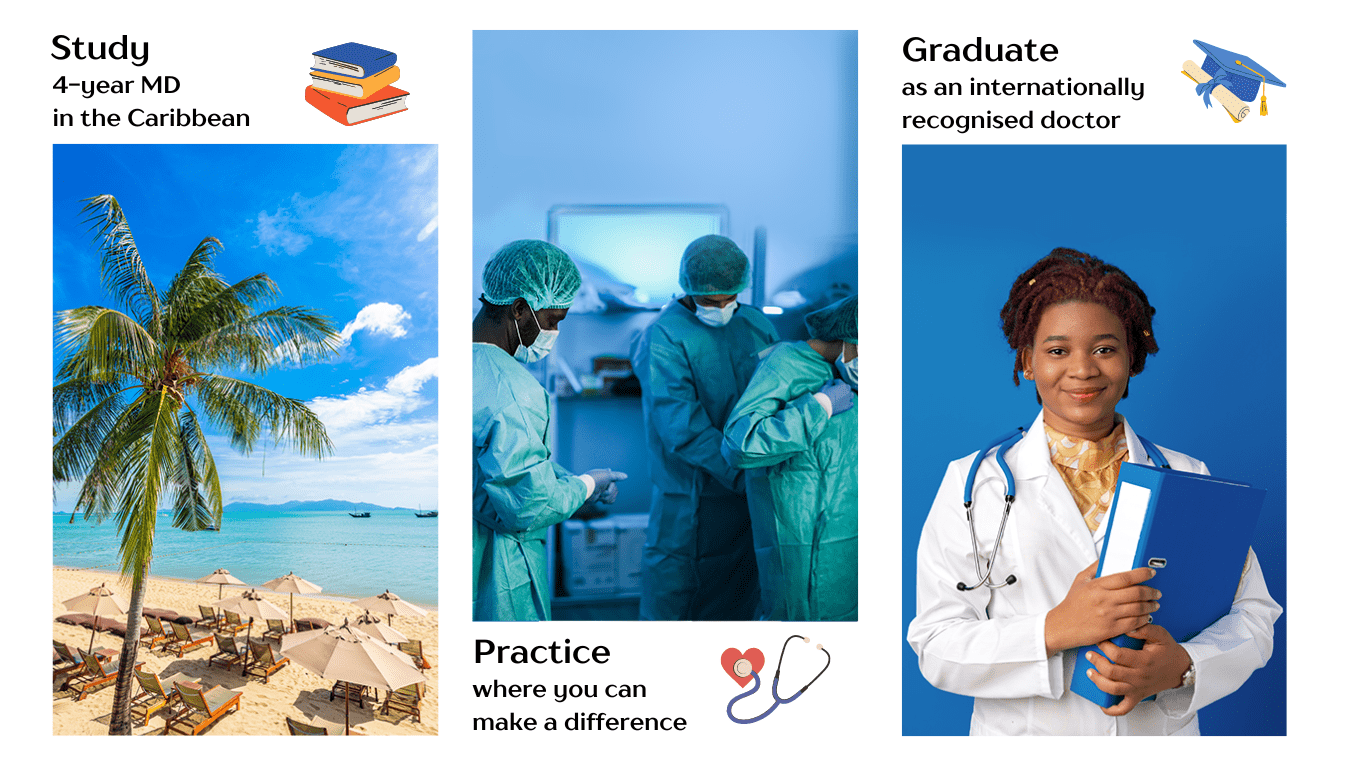

Are universities in Romania GMC approved